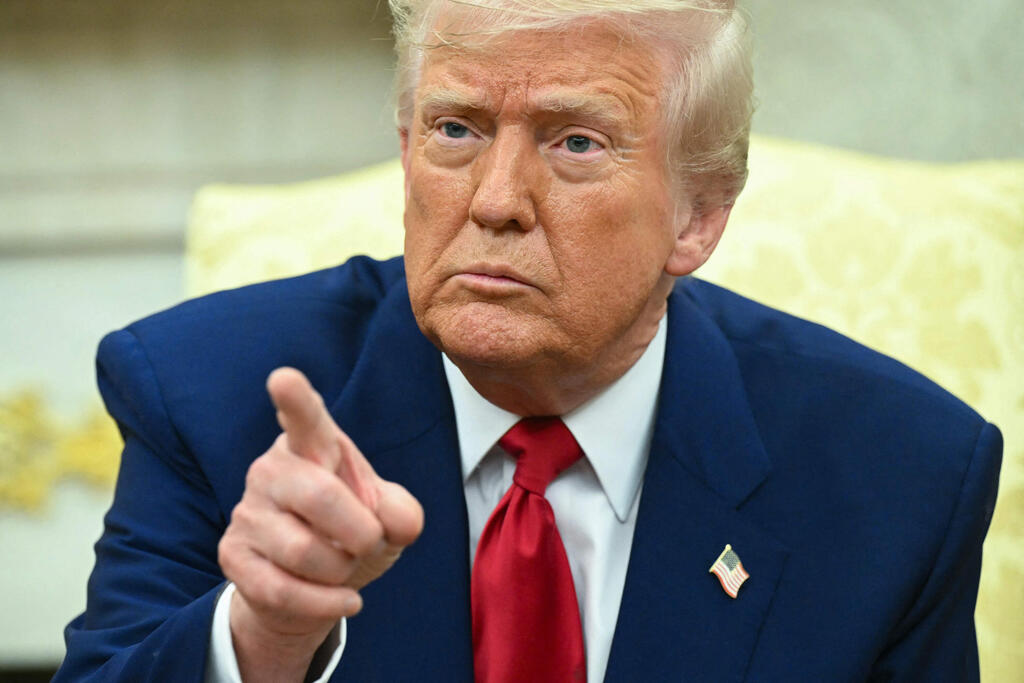Getting your Trinity Audio player ready...
One moment at the Oval Office on Monday was telling. Prime Minister Benjamin Netanyahu swallowed hard, then bowed his head when U.S. President Donald Trump announced that the United States was speaking directly with Iran about its nuclear program.
Netanyahu was not the only one surprised by Trump’s words. Some American officials were unaware that the president would announce the direct talks, with Netanyahu sitting beside him.
US President Donald Trump announces direct negotiations with Iran to begin Saturday
(Video: Reuters)
Israeli officials had said the main purpose of Netanyahu’s hurried trip to Washington was to discuss the tariffs imposed on Israeli imports. “We are aware of contact between the United States and Iran and are not concerned,” they said. But the White House had prepared an unpleasant surprise for Netanyahu—not just by revealing that discussions were already underway, which was known in Jerusalem,
but by making the negotiations public, at the presidential level, of the utmost importance, and described as “direct”—all while Netanyahu was in the Oval Office.
Israeli officials found some consolation in one outcome: President Trump’s explicit threat against Iran if negotiations were to fail, made in response to a question by journalist Barak Ravid. Trump warned that Iran would be in “great danger.” Tehran is known to resist negotiating under pressure from deadlines and military threats. The president made clear this was exactly the approach being taken.
The Israelis believe that the Iranians—who consider themselves masters of negotiation—often misunderstand the other side, and therefore the talks are likely to fail. And when that happens, Trump would realize that only a military strike will bring Iran back to the table.
Trump did not mean to humiliate Netanyahu
Nearly all questions asked during the extended press availability in the Oval Office were directed at Trump and focused on the tariffs imposed on imports to the United States. The Middle East was not the focus of media interest.
Officials agreed the meeting between Netanyahu and Trump was positive and pleasant. But the results, from Netanyahu’s perspective, were minimal. Trump not only kept the 17% tariffs on Israeli imports in place—he gave no indication they would be removed or reduced. Trump even took a jab at the prime minister by congratulating him on the $4 billion in military aid Israel receives annually from the United States.
This came after Israel wasted its remaining leverage by removing all tariffs from U.S. imports to Israel. That was a mistake. It would have been better to offer that gesture directly to the president.
Netanyahu then promised to eliminate the trade deficit that exists in Israel’s favor, although he gave no details on how that would be achieved.
The president also made it clear he does not share Netanyahu’s concerns about Turkey’s growing involvement in Syria, despite statements from Turkish President Recep Tayyip Erdogan. “I like him,” Trump said of the Turkish leader, and offered to mediate between Israel and Turkey if conflict arises.
Get the Ynetnews app on your smartphone: Google Play: https://bit.ly/4eJ37pE | Apple App Store: https://bit.ly/3ZL7iNv
The positive news for Netanyahu out of the White House was the president’s full support for Israel’s offensive in Gaza. He even praised Netanyahu for his strong leadership and his efforts to secure the hostages’ release.
“There are other options,” Trump said, before describing the cruelty of Hamas and the conditions endured by the hostages in Gaza. Trump’s apparent personal commitment to the hostages’ fate—and the involvement of his envoy
—represent a significant ray of hope in bilateral relations, and perhaps beyond.
After years of claiming that he alone could educate the world about the threat posed by Iran and prevent it, Trump’s claim is now being put to the test.







